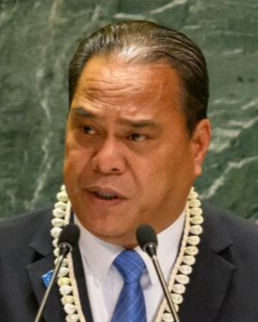Pacific islands bound by climate change, divided by deep-sea mining: Nauru swimming against the tide
- Admin

- Oct 2, 2025
- 3 min read

By Mar-Vic Cagurangan
“The climate crisis is not up for debate,” Micronesian President Wesley Simina said. “The only question is whether we will act with the urgency it demands.”
Pacific island leaders agreed. At the 80th session of the United Nations General Assembly in New York during the last week of September, island leaders delivered a common message: climate change is no longer a distant threat but an immediate danger. They are sinking.
They called for bolder global commitments amid the rising seas.
UN Secretary General António Guterres said the world is already in the “dawn of a new energy era,” one where clean energy must replace fossil fuels, and where finance and justice remain at the heart of the global response.
“The bottom line: clean is competitive and climate action is imperative,” Guterres declared, calling for “dramatic emissions cuts” aligned with 1.5°C goal of the landmark Paris Agreement on climate change, agreed by all nations in 2015.
Pacific islands, however, are polarized over the deep-sea mining solution, eyed by Nauru, the Cook Islands and Kiribati, to transition away from fossil fuels.

Simina urged caution on seabed mining, insisting that “comprehensive science and consultation with Pacific communities must come first.”
Palau President Surangel Whipps Jr. agreed. “Deep-sea mining has been incorrectly promoted as a silver bullet for the climate crisis. If we rush forward without understanding the consequences, we risk inflicting irreparable harm,” he said in his remarks at UNGA.
“The loss of biodiversity, the release of carbon, damage to our water column, and the destruction of fisheries that sustain our people is unfathomable,” he added.
During the Third UN Ocean Conference in June, Palau joined 38 countries that came together to support a moratorium on deep-sea mining. “Our message is clear. We must let science guide before we exploit the deep sea,” Whipps said.
Around 16,404 feet beneath the northern Pacific Ocean, the whole seabed—stretching around 4,500 miles from east to west—is littered with potato-sized chunks of what look like charcoal lumps called polymetallic nodules.

The U.S. Bureau of Ocean Energy Management has begun the exploration process for deep-sea mineral exploration off the coast of American Samoa.
This comes amid outcry from environmental groups and advocates over an executive order signed by U.S. President Donald Trump in April this year aimed at jump-starting deep-sea mining in U.S. and international waters.
The Marshall Islands said a moratorium on seabed mining in the high seas must be in place “until there is a code with adequate safeguards and until we have a close understanding of impacts and biodiversity at stake.”

“More political will is needed to break through a mentality of ‘drill first, ask later’ before even assessing what is at stake, including the impacts on fisheries and marine food chains,” President Hilda Heine said.
The Marshall Islands has enacted its own national ban on deep seabed mining permits, as it documents and manages seamount biodiversity within its exclusive economic zone.
“As important an opportunity as seabed mining may become, it cannot be at the irreversible expense of our Pacific waters and vast fisheries,” Heine said.
Nauru swims against the tide as it seeks to defend its plan to tap the ocean’s seafloor. The tiny island nation has special rights in the Clarion Clipperton Zone through the International
Seabed Authority, drawing criticisms from neighboring islands.
“These criticisms, however, miss the point,” Nauru President David Adeang said.
He said ISA faces the complex challenge of balancing competing priorities while fulfilling its mandate.
“The true focus should be on ensuring the ISA fulfills its mandate to the common heritage of humankind; the exercise of legitimate member state rights is essential to holding the authority accountable and prompting it to fulfill that mandate,” Adeang said.

“As both a small island developing state and a sponsoring state for deep seabed mineral exploration, Nauru has invested significantly through our sponsored entity to access minerals essential to powering the world’s transition away from fossil fuels and advancing the common heritage of humankind,” he added.
He said Nauru has consistently advocated for robust regulations that balance responsible mineral recovery with effective environmental protection.
“When Nauru invoked the two-year rule, we did so in good faith, expecting the multilateral system to fulfill its treaty obligations in the same spirit,” he said. “Yet, negotiations remain polarized, and the timely adoption of the regulations appears increasingly elusive.”
The debate, Adeang said, will only prolong the inevitable action. “The choice before us is clear: either we source these critical minerals responsibly through strong regulatory frameworks, or we continue to give in to delay,” he added.
Subscribe to
our digitral
monthly edition






